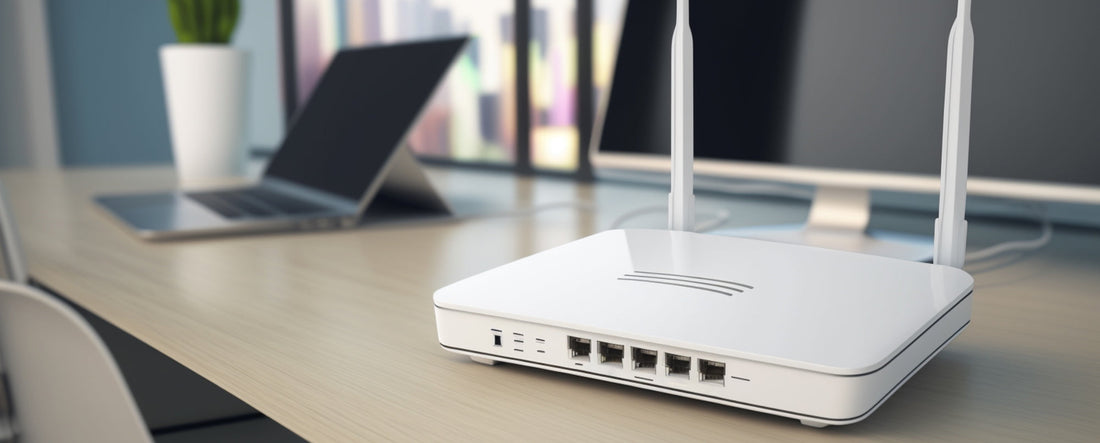
BOOST WI-FI SIGNAL: THE BEST TIPS AND TECHNIQUES
Share

A strong and stable Wi-Fi signal is essential for a fast internet connection throughout the house – for PC and laptop, tablet or smartphone, TV streaming, or smart speakers.
However, many users complain about weak Wi-Fi, dropouts, or slow speeds in certain rooms. In this article, you will learn how to boost your Wi-Fi signal, what technical options are available, and which router settings can improve coverage.
Optimal Router Placement for a Strong Wi-Fi Signal
The location of the router has a significant impact on signal strength. Incorrect placement can lead to considerable range and speed losses.
Important Placement Tips:
- Central Placement: The router should be placed as centrally as possible in the home to distribute the signal evenly.
- Elevated Position: Ideally, the router should be placed on a shelf or table rather than on the floor.
- Clear Surroundings: Walls, furniture, or metallic objects can weaken the Wi-Fi signal.
- Avoid Interference: Electronic devices such as microwaves, Bluetooth devices, or cordless phones can interfere with the signal.
Boost Wi-Fi Signal with Optimal Router Settings
Many modern routers offer numerous settings to optimize the Wi-Fi signal.
Important Router Settings to Enhance the Signal:
- Firmware Updates: Regularly update the firmware to receive performance improvements and security updates.
- Adjust Wi-Fi Channel: Many routers broadcast on heavily used frequencies by default. Change the channel in the router settings to a less congested one.
- Use the 5 GHz Frequency Band: If your router and devices support it, you should use the 5 GHz band. It offers higher speeds and less interference.
- Adjust Transmission Power: In the router settings, you can often increase the transmission power to improve range.
Extend Wi-Fi Coverage with Repeaters, Mesh Systems, and Powerline Adapters
Besides router settings, there are various technical solutions to improve the Wi-Fi signal.
Wi-Fi Repeaters
A Wi-Fi repeater amplifies the existing Wi-Fi signal, extending its range.
- Placement: Best positioned where the signal is still stable but already weakening.
- Performance: Repeaters often halve the bandwidth as they relay the signal. For streaming and gaming, they may have limited benefits.
Mesh Wi-Fi Systems
Modern mesh systems are a powerful alternative to repeaters.
- Better Performance: Mesh networks distribute the signal more efficiently than traditional repeaters.
- Automatic Optimization: Mesh systems detect the best connection route and automatically optimize bandwidth.
Powerline Adapters
Powerline adapters use the electrical wiring to create a local network.
- Alternative to Wi-Fi Repeaters: Particularly useful in houses with thick walls.
- Easy Installation: Simply plug into a power outlet and connect to the router.
Boost Wi-Fi Signal: Frequently Asked Questions
What is the difference between a Wi-Fi booster and a Wi-Fi repeater?
A Wi-Fi repeater receives the existing signal and relays it amplified. A Wi-Fi booster is a general term and can refer to various devices.
How does a plug-in Wi-Fi booster work?
A plug-in Wi-Fi booster is usually a Wi-Fi repeater or a powerline adapter with Wi-Fi functionality.
Which Wi-Fi router settings enhance the signal?
- Switching to the 5 GHz frequency band
- Increasing transmission power
- Optimizing the Wi-Fi channel
- Using QoS settings to prioritize important devices
Is it worth upgrading to a more powerful router?
Yes, especially if your current router is outdated or does not support modern standards like Wi-Fi 6.
Are expensive Wi-Fi cables or shielding necessary?
In most cases, proper positioning and the right settings are enough to optimize the signal.
Conclusion: Boosting Wi-Fi Signal Easily and Efficiently
A strong Wi-Fi signal is crucial for a stable internet connection throughout the household. By optimizing router placement, making targeted settings adjustments, and using repeaters, mesh systems, or powerline adapters, the Wi-Fi signal can be significantly improved.
If that is not enough, modern networking technologies are a useful addition to ensure a reliable and fast Wi-Fi connection. However,
